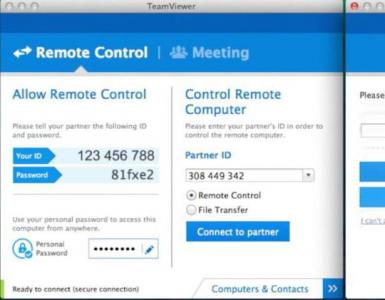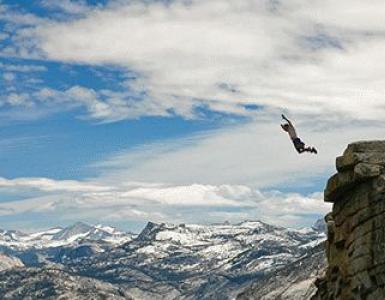Presentation of school government elections. Presentation on the topic “Electing the Leader of Student Government
Presentation for class on the topic:
Student government
Completed by: Mathematics teacher Galina Nikolaevna Arkhipova, Municipal Educational Institution “Secondary School No. 41”, Magnitogorsk

“If you want to achieve something significant in this life, it’s not enough to just act - you also have to dream; It’s not enough to just plan - you also have to believe.”

- introduce students to the concepts of “Co-management”, “Student co-management”, “Leader”;
- master an active communication style and develop partnership relationships in the group;
- practice identifying clear and distinct signs of leadership behavior, awareness of leadership qualities;
- introduce the responsibilities of a class leader.

- a specific organization of collective activity, the purpose of which is the self-development of the individual.

- Teaches children the ability to lead and obey.
- Teaches you to be demanding, objective, and independent.
- Helps foster a sense of responsibility and collectivism.
- Develops the right attitude towards criticism.
- Creates the conditions for the manifestation and development of the abilities of each student.
- Provides an opportunity to clearly and efficiently organize work in the classroom and school.




- dominant personality;
- having a quick reaction to a situation;
- the one you want to follow;
- one that is so noticeable that whether to obey it or not is not a question;
- having maximum influence on others

The mayor of the class, like any leader, must know his responsibilities.
Responsibilities of the Class Mayor:
- together with the class teacher, draws up a work plan for the quarter (based on student suggestions);
- is responsible for the work of the Class Asset and reports to the Presidential Council of the school on the work of the class;
- forms teams (action councils) to prepare and conduct classroom and school events;
- declares gratitude and imposes penalties;
- Monitors the execution of orders.
- Keeps a notebook by the class measure

- Monitors attendance and readiness for classes;
- Monitors the keeping of diaries and maintains a progress notebook;
- Together with the headman, he manages the Class Asset;
- Leads a class mutual aid society;
- Replaces the class leader and represents the interests of the class on the School Council in his absence.

Each of you should strive to ensure that the class teacher and classmates feel your help, support and active work in the class.
The work of student (class) self-government depends on the organization of the class activist with whom the class mayor conducts the work.
Therefore, everything depends on you!

- Alexandrova M.A., Baranova E.I., Volodina E.V., Stepanova E.N. To the class teacher about self-government in the classroom. - Method. recommendations. – TC, M., - 2006
- Kipnis M. Leadership training – 3rd ed., additional. – M.: Os-89, 2008.-P.35
- Rozhkov M.I., L.V. Bayborodova Organization of the educational process at school. – M., VLADOS 2001.
- Rozhkov M.I., Development of self-government in a children's team. M., 2004.
- http://yandex.ru/
- http://festival.1september.ru/articles/534831/
- http://nsportal.ru/shkola
Slide 1
 Slide 2
Slide 2
 Slide 3
Slide 3
 Slide 4
Slide 4
 Slide 5
Slide 5
 Slide 6
Slide 6
 Slide 7
Slide 7
 Slide 8
Slide 8
 Slide 9
Slide 9
The presentation on the topic “School self-government” can be downloaded absolutely free of charge on our website. Project subject: Social studies. Colorful slides and illustrations will help you engage your classmates or audience. To view the content, use the player, or if you want to download the report, click on the corresponding text under the player. The presentation contains 9 slide(s).
Presentation slides

Slide 1
School self-government
GOAL: Formation of the leading qualities of a moral personality through children's public organization. OBJECTIVES: 1. Instilling in children high civic feelings and love for their homeland; 2. Development of a socially active, morally and physically healthy personality, in changing conditions of social life; 3. Training in technology for collective creative activity.

Slide 2
Council of Ministers
“Forest Republic” includes six ministries: -Ministry of Education; -Ministry of Law and Order; -Ministry of Culture; -Ministry of Sports; -Ministry of Press; -Ministry of Labor.

Slide 3
Ministry of Education
intended for development cognitive interests students, Functions: - organizes work to help study; - helps teachers in preparing and conducting subject Olympiads and self-government days; - keeps records and develops a system of rewards for the best students of the school; - increasing the level of knowledge and, accordingly, the level of student achievement; - creation and organization of work of advisory groups on academic subjects, methodological groups; - control over the maintenance of notebooks, diaries, students’ readiness for lessons; - collection of statistical data on academic performance; - work with underachieving or low-achieving students.

Slide 4
Ministry of Law and Order
is intended for the formation of conscious discipline of students, the formation of their legal culture. Functions: - monitors compliance with the school Charter and the Constitution of the Republic; - makes proposals to amend the Charter and Constitution; checks the behavior of schoolchildren during and after school hours; - stimulates and encourages excellent implementation of the School Charter and the Constitution of the Republic; - checking attendance at training sessions; - control over order and discipline at school; - work with students who are registered within the school, registered in the OPDN, as well as with their families; - organizing school duty

Slide 5
Ministry of Culture
designed to form creativity students, identifying the interests, abilities and inclinations of students. Functions: - organizes school holidays and extracurricular activities; - organizes at all levels creative activity in the field of moral, spiritual, civic education; - keeps records and develops a system of rewarding students’ creative achievements; - organization and holding of public cultural events mass events; - organization of leisure and entertainment for children; - children’s real comprehension of the basics market economy through participation in labor affairs (cleaning school areas, etc.); - organization of children's recreation; - familiarization with world and domestic cultural values and moral norms.

Slide 6
Ministry of Health and SPORT
is intended to develop in students healthy image life, involvement in sports and physical culture, fostering respect for oneself, one’s health and the health of others. Functions: - together with teachers, organizes and conducts sports festivals and events; - keeps records and promotes students’ sports achievements; - develops a system of rewards for sports achievements; - promotion of healthy lifestyles; - introduction of health-saving technologies into the educational and educational process; - identification of talented athletes capable of performing at regional, regional and other competitions; - organization of tourism work. .

Slide 7
Ministry of PRESS
designed to develop the creative and artistic abilities of students. Functions: publishes school newspapers; controls the publication of class newspapers; designs stands, etc.; education of aesthetic feelings in students; informing students, teachers, parents about school life, events, activities, decisions of school government bodies, achievements; organizing the publication of thematic wall newspapers

Slide 8
Ministry of Labor
intended for the formation and development of labor skills, responsibility for the results obtained, the quality of work, for the world. Functions: plans and organizes work to preserve and transform the school and school grounds; organizes school duty; organizes and conducts general cleaning and subbotniks. The main task of the duty officers is to ensure strict implementation of the school routine, full compliance by all students with the uniform requirements accepted at school, and maintaining cleanliness. Each class is on duty for one week, according to the schedule.

Slide 9
Good luck to you in your initiatives!
Think Propose Act Analyze Evaluate
voting and the beginning of counting votes is prohibited. Article 5. Compilation of voter lists. Voter lists are compiled by the election commission in the prescribed form (in alphabetical order) indicating the class, surname, first name, patronymic of the voter. Voter lists are signed by the chairman and secretary of the election commission. The voter list must provide space for the voter to provide a signature for each ballot paper received by him to affix the signature of the member of the election commission who issued the ballot papers to the voter. On the eve of voting day, the election commission updates the list of voters taking into account the departing and newly arrived voters, making appropriate changes to it. All corrections in the voter list are certified by the signatures of the chairman and secretary of the election commission. Article 6. Familiarization of voters with the voter list. The voter list is provided by the election commission for review by voters no later than five days before voting. A school student who has the right to vote has the right to report to the election commission about the absence of his data in the voter list, about any error or inaccuracy in information about him. Article 7. Ballots. Ballots are produced by the school publishing house solely on the orders and under the supervision of members of the election commission and are a document of strict accountability. Chapter 3. Nomination and registration of candidates for the position of Leader of the School Student Government. Candidates' proxies. Article 8. The right to nominate candidates for the positions of Leader of Student Government. 1. Candidates may be nominated by self-proposal, as well as by electoral associations and electoral blocs during the period from April 1 to April 10. 2. A candidate is considered registered after the election commission receives a written statement of his consent to run for the position of Leader of the Student Government and his name is included in the list of candidates.
Slide 1
 Slide 2
Slide 2
 Slide 3
Slide 3
 Slide 4
Slide 4
 Slide 5
Slide 5
 Slide 6
Slide 6
 Slide 7
Slide 7
 Slide 8
Slide 8
 Slide 9
Slide 9
 Slide 10
Slide 10
 Slide 11
Slide 11
 Slide 12
Slide 12
 Slide 13
Slide 13
 Slide 14
Slide 14
 Slide 15
Slide 15
 Slide 16
Slide 16
 Slide 17
Slide 17
 Slide 18
Slide 18
 Slide 19
Slide 19
 Slide 20
Slide 20
 Slide 21
Slide 21
 Slide 22
Slide 22
 Slide 23
Slide 23
The presentation on the topic “School student government” can be downloaded absolutely free on our website. Project subject: Pedagogy. Colorful slides and illustrations will help you engage your classmates or audience. To view the content, use the player, or if you want to download the report, click on the corresponding text under the player. The presentation contains 23 slide(s).
Presentation slides

Slide 1

Slide 2
School self-government is a process of constructive interaction between schoolchildren and school administration; School self-government is the participation of schoolchildren in school management; School self-government is a phenomenon that unites all school initiatives. School self-government is a special form of proactive independent social activities schoolchildren, aimed at solving issues related to the organization of education, leisure, as well as the development of social activity of schoolchildren.
School self-government

Slide 3
Goals of school government activities
protection and representation of the rights and interests of schoolchildren; assistance to schoolchildren in solving educational and social issues affecting the interests of schoolchildren; preservation and development of the school’s democratic traditions; personal development students in the process of interaction.

Slide 4
Objectives of school government activities
promoting civic and social self-realization of schoolchildren; development of proposals to improve quality educational process; solving current student problems; optimization of leisure activities; developing self-management skills in students.

Slide 5
School administration
School Council Teachers Council
Senior Council
Structure of school government
Parent community
Teaching staff
Student Committee
Leisure Committee
Committee on Tourism and Sports
Organizational Affairs Committee
Classroom student government

Slide 6
School Council Structure
The school council includes members of the Senior Student Council, students and teachers interested in solving specific issues. The Council of High School Students includes representatives of grades 5-11 - chairmen.

Slide 7

Slide 8
General provisions
The Senior Student Council is the representative of the interests and rights of students. the Council is headed by a Chairman elected for a period of 1 year; members of the Council are representatives from students in grades 5-11; The high school student council consists of committees: the press and information committee, the tourism and sports committee, the cultural and mass committee, the organizational affairs committee, and the educational committee; each committee has teacher consultants; committee meetings are held once a month, the Council of High School Students - 2 times a month; The council of high school students has the right to contact the school administration with a proposal and request and receive a comprehensive answer.

Slide 9
RIGHTS AND RESPONSIBILITIES of members of the Council of High School Students
R A V A: to be elected to one of the committees of the Council of the Council; take part in the development of events and their implementation; take part in the development of the program educational work At school; monitor the implementation of children's rights at school. RESPONSIBILITIES: work according to the regulations of the Council in deadlines; maintain connections with extracurricular institutions and schools in the city and region; serve on one of the Council committees. Teachers and parents can participate in the work of any committee with voting rights.

Slide 10
Committees: Press and Information Committee; Committee on Tourism and Sports; Committee on Cultural Work; organizational affairs committee; educational committee;

Slide 11
RESPONSIBILITIES OF KEY OFFICERS OF THE HIGH SCHOOL COUNCIL
Chairman: organizes strategic planning of the Council’s activities; determines the agenda and presides over meetings of the Senior Student Council; coordinates the work of class councils; provides assistance to class council chairmen; exercises control over the implementation of the decision of the Council of High School Students.

Slide 12
PRESS AND INFORMATION COMMITTEE
holds a meeting of members of the editorial board of class councils, explains to the editorial board their goals, objectives, and responsibilities; develops a work plan for the committee; is responsible for notifying all events held in schools; organizes the production of a school magazine and newspaper; organizes design work; supervises information work in the classroom; is responsible for the decoration of the school; provides a report on the work to the chairman of the Council of High School Students.

Slide 14
COMMITTEE ON TOURISM AND SPORTS
holds meetings of members of class councils, explains to them goals, objectives, responsibilities; develops a sports and tourism program for the year, proposes a plan of main events; participates in the organization of all sports and tourism events at the school; is a member of the panel of judges; provides a report on the work to the chairman of the Council of High School Students.

Slide 16
COMMITTEE FOR CULTURAL WORK
holds meetings of members of class councils, explains to them goals, objectives, responsibilities; develops a program of major cultural events for the year, indicating goals and objectives; participates in the organization of all cultural events of the school; provides a report on the work to the chairman of the Council of High School Students.

Slide 18
ORGANIZATIONAL AFFAIRS COMMITTEE
holds meetings of members of class councils, the person responsible for duty explains the goals, objectives, responsibilities; develops a control system for the school and classes; controls duty officers at posts; organizes school duty during public events; provides a report on the work to the chairman of the Council of High School Students.

Slide 20
holds meetings of members of class councils, the person responsible for duty explains the goals, objectives, responsibilities; develops a system for monitoring attendance and student progress in school and classes; conducts raids to check educational supplies and preparedness for lessons; provides a report on the work to the chairman of the Council of High School Students.

Tips for making a good presentation or project report
- Try to involve the audience in the story, set up interaction with the audience using leading questions, a game part, do not be afraid to joke and smile sincerely (where appropriate).
- Try to explain the slide in your own words, add additional Interesting Facts, you don’t need to just read the information from the slides, the audience can read it themselves.
- There is no need to overload the slides of your project with text blocks; more illustrations and a minimum of text will better convey information and attract attention. The slide should contain only key information; the rest is best told to the audience orally.
- The text must be well readable, otherwise the audience will not be able to see the information being presented, will be greatly distracted from the story, trying to at least make out something, or will completely lose all interest. To do this, you need to choose the right font, taking into account where and how the presentation will be broadcast, and also choose the right combination of background and text.
- It is important to rehearse your report, think about how you will greet the audience, what you will say first, and how you will end the presentation. All comes with experience.
- Choose the right outfit, because... The speaker's clothing also plays a big role in the perception of his speech.
- Try to speak confidently, smoothly and coherently.
- Try to enjoy the performance, then you will be more at ease and less nervous.













